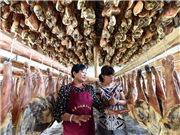

 |
| UN Secretary-General Ban Ki-moon (C) speaks during the unveiling ceremony of a permanent memorial named "Ark of Return" to honour the victims of slavery and the transatlantic slave trade, at the UN headquarters in New York, on March 25, 2015. The UN unveiled a permanent memorial at the UN Headquarters in New York on Wednesday to honor the victims of slavery and the transatlantic slave trade. (Xinhua/Niu Xiaolei) |
UNITED NATIONS, March 25-- The United Nations unveiled a permanent memorial at the UN Headquarters in New York on Wednesday to honor the victims of slavery and the transatlantic slave trade.
The memorial, The Ark of Return, which stands at the UN General Assembly visitors' Plaza, offers an opportunity for people to reflect the past and remind them not to repeat the tragedy in the future, according to the memorial's designer Rodney Leon, an American architect of Haitian descent.
The pristine white marble structure was selected through international competition announced in September 2013.
"This poignant and powerful memorial helps us to acknowledge the collective tragedy that befell millions of people. It encourages us to consider the historical legacy of slavery and, above all, it ensures that we never forget," said UN Secretary- General Ban Ki-moon at the unveiling event.
The monument, Ban said, offers people a place to pause and reflect on the causes and consequences of racism so people may eradicate prejudice and intolerance wherever and whenever it occurs.
"I hope The Ark of Return will also serve as a call to action against the many contemporary manifestations of slavery, from human trafficking and sexual enslavement to debt bondage," he added.
Every year on March 25, the International Day of Remembrance for the Victims of Slavery and the Transatlantic Slave Trade offers the opportunity to honor those who suffered and died at the hands of the slavery system.
This year's theme is women and slavery, which pays tribute to and celebrates the strength of the many enslaved women who endured unbearable hardships, including sexual exploitation, as well as those who fought for freedom from slavery and advocated for its abolition.
According to the UN, more than 15 million men, women and children were deported from Africa through the Transatlantic Slave Trade, which took place from 16th century to 19th century. And one third of them were women.
Day|Week

 Tsinghua junior makes over 10,000 yuan a day by selling alumnae's used quilts
Tsinghua junior makes over 10,000 yuan a day by selling alumnae's used quilts Graduation photos of students from Zhongnan University
Graduation photos of students from Zhongnan University A school with only one teacher in deep mountains
A school with only one teacher in deep mountains Glimpse of cultural heritage "Xilankapu"
Glimpse of cultural heritage "Xilankapu" Homemade cured hams in SW China
Homemade cured hams in SW China Breathtaking buildings of W. Sichuan Plateau
Breathtaking buildings of W. Sichuan Plateau Graduation photos of "legal beauties"
Graduation photos of "legal beauties" Top 10 most expensive restaurants in Beijing in 2015
Top 10 most expensive restaurants in Beijing in 2015